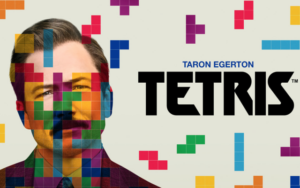TETRIS: 3 STARS. “could use the simplicity of the game whose story it tells.”
 The addictive puzzle video game “Tetris,” created by Soviet software engineer Alexey Pajitnov, couldn’t be simpler. Stack differently shaped pieces to form a whole and win points.
The addictive puzzle video game “Tetris,” created by Soviet software engineer Alexey Pajitnov, couldn’t be simpler. Stack differently shaped pieces to form a whole and win points.
The story behind its success isn’t.
A new movie starring Taron Egerton and now playing on Apple TV+, tells the story of how Dutch video game designer Henk Rogers fit the differently shaped pieces of international intrigue and video game creation together to secure the intellectual property rights to popular game.
“The Soviet Union has worldwide rights,” says Rogers. “Nothing gets out easily.”
And how. In what is essentially a big business ticking clock story, Egerton is Rogers, an aggressive entrepreneur who discovers an early version of the simple game at the Consumer Electronics Show in the mid-1980s. An early adopter of video game technology, Rogers knows Tetris can be a hit.
“It was the most beautiful thing I’d ever seen,” he says. “I played for five minutes, and I still see falling blocks in my dreams. It is poetry. It is the perfect game.”
Developed by a Russian government software engineer Pajitnov (Nikita Efremov) in 1984, the game was an underground hit in the USSR, and starting to attract attention from other big players. The underdog Rogers finds himself up against Nintendo, media mogul Robert Maxwell (Roger Allam) and the Russian government.
“You want to play with the big boys?” threatens Maxwell. “This is how the world works.”
“Tetris” is a convoluted tale of how Rogers navigates dubious agreements, business backstabbing and the very real threat of Russian prison, to secure the rights to the game and a future for his family. Unlike the game, the movie’s pieces don’t fit together easily. Part business story, part spy thriller, it piles a great deal of information into every scene, beginning with an unloading of exposition off the top that sets the scene, but may try the patience.
Once past the initial mound of info, screenwriter Noah Pink keeps up the pace, piling double-crosses on top of political scheming on top of jet setting skullduggery. It zips along at the speed of level 10 game play, and while it is sometimes hard to keep track of who is zooming who, Pink keeps it fairly linear, mostly focusing on how the various deals affect Rogers. Told from this point of view, the complicated story of contract law and how the negotiations for a video game became a Cold War concern, is marginally easier to follow.
At the center of it all is the elaborately mustachioed Egerton. As Rogers he brings an energizer bunny approach to the entrepreneur’s unrelenting belief in the game and himself. As the story gets bigger and bigger—Henk against the world—it is Egerton that provides the human element, particularly in his friendship with Pajitnov. The surrounding performances are rather broad, but Egerton keeps it real.
Although it does feature 8-bit animation, “Tetris” isn’t a video game movie. Instead, it is a John Le Carre Lite political thriller, which could have used some of the simplicity of the game whose story it tells.
